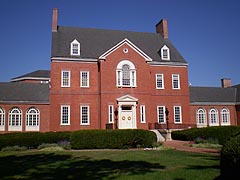By Sarah Tincher
Capital News Service
ANNAPOLIS – With the Maryland gubernatorial election approaching at the end of the year, the seven major candidates are taking a stance on one of the state’s hot-button issues: taxes.
In response to a Capital News Service questionnaire, the gubernatorial hopefuls expressed their thoughts on the state’s current estate tax and personal and corporate income tax policies, and proposed their tentative plans of action.
The four Republican candidates — Anne Arundel County real estate broker Larry Hogan, Charles County businessman Charles Lollar, Harford County Executive David Craig and Anne Arundel Delegate Ron George — all stated that they wanted to lower the income tax levels across the board.
“Our current personal income tax rates are absurdly high and hurt not only individuals but small businesses as well,” George said.
George introduced his plan to cut the tax rate by 10 percent, eventually leading to the implementation of a flat tax, whereas Lollar and Craig both proposed to implement a policy that would eliminate the state’s personal income tax altogether over a five-year period.
However, Delegate Heather Mizeur, D-Montgomery, was the only Democratic candidate to announce a tax reform plan that she says would benefit 90 percent of Marylanders, by making the state’s wealthiest citizens pay more while lower-earners get state income tax cuts.
The corporate income tax rate, which currently stands at 8.25 percent, has also received a lot of attention in state politics.
All of the candidates agree that Maryland needs to be more regionally competitive.
They just don’t agree how to accomplish this.
“Maryland’s corporate taxes need to be at a level that makes us regionally competitive with our neighbors and we must consider the overall costs of doing business in our state versus others,” Hogan said. “We don’t necessarily need the lowest tax rates but we certainly can’t afford the highest either.”
Of the Republican candidates, George, Lollar and Craig specified that the corporate tax rates should be be gradually lowered to rates of 5.75 percent, 5 percent and 4 percent, respectively.
On the other side of the aisle, Gansler also introduced a plan for lowering the rate, beginning with a 0.25 percent decrease during his first year in office, if elected.
“To be more competitive with our surrounding states in the Mid-Atlantic region we will phase in a lowering of the corporate income tax,” Craig said. “We will then see our economic base grow with larger businesses.”
Conversely, Mizeur fully refuted this proposal.
“Lowering Maryland’s corporate tax (already the second lowest in the region) does not increase our competitiveness,” Mizeur said, “rather, it is a race to the bottom that would limit state revenue for critical investments in education, health care, public safety and infrastructure.”
And while Lt. Gov. Anthony Brown didn’t include any specifics in his response, he said he is committed to a tax reform that would “make Maryland the most competitive business climate in the nation.”
“…Any changes to our tax structure, including personal income taxes, estate taxes and corporate taxes must be fair and reflect Maryland’s commitment to growing its economy, creating jobs and growing and protecting the middle class,” Brown said.
During the recent legislative session, the Maryland General Assembly passed a measure to raise the state’s estate tax threshold from its current $1 million level to the federal exclusion amount, which currently stands at $5.34 million. Gov. Martin O’Malley is expected to sign the bill into law.
Lt. Gov. Anthony Brown is a Democratic candidate for governor. Photo courtesy of the Brown campaign.
Most candidates, including Hogan, Lollar, Craig, Gansler and George, expressed interest in providing residents some form of relief from the estate tax.
“As I travel across the state, I overwhelmingly hear from Marylanders that our state has become too expensive for retirees,” Gansler said. “Maryland should be a state that holds on to its retirees, where generations stay and grow future generations.”
Craig and Lollar both want to repeal the estate tax altogether.
“Both the estate and inheritance taxes – ‘death taxes’ – should be totally repealed,” Lollar said. “I see it as akin to ‘grave robbing’ and government theft of property for which income taxes were previously paid by the decedents in the course of the development of these assets.”
But once again, Mizeur stands alone, this time strongly opposing the exemption level increase.
“Make no mistake: the plan to roll back estate taxes is an election-year giveaway to millionaires, and an enormous loss of state revenue,” she said. “I voted against this legislation pending in the current General Assembly session and have called on Governor O’Malley to veto this plan.”





Recent Comments